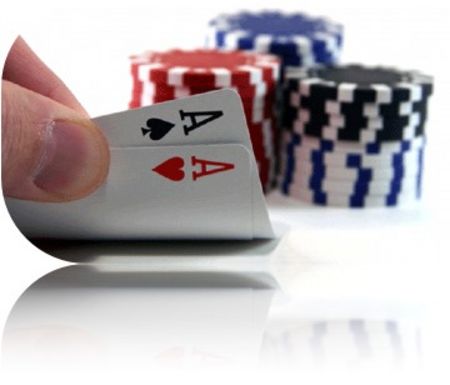Two-suited or Two-connected

You should almost always play two pair strongly with these types of flops since you
do not want to give a free card and you want to collect bets from your opponents
making draws. This is especially true when the pot is large or you are against
several opponents.
When the pot is large, almost always bet out or raise at every opportunity. Only
consider check-raising if you are confident an opponent will bet and your check-
raise will force your opponents with gut-shot or backdoor flush draws to call two
small bets. Check-raising with top two pair is risky since it is less likely that your
opponents were helped by the flop. You should usually only try a check-raise
against an aggressive preflop raiser in late position who will almost always bet.
Similar to sets, if the pot is very large and it would be difficult to drive out opponents
on the flop, you might wait to raise the turn if this will give you a better chance of
driving out opponents.
If the pot is small and you are acting first, check-raising is a good option against
one or two opponents. Betting out will likely cause your opponents to fold since it is
unlikely they were helped by the flop when you hold two of the flop cards in your
hand. If they have a draw, they will likely bet out and you can check-raise charging
them a higher price for their draws. If they take a free card, it is not too dangerous
since the pot is small and you have a strong hand.
Internet Tip
As discussed previously, players tend to check-raise more on the Internet than in a live game. Since
players check-raise on the Internet so often, your opponents won't respect your check-raises quite
as much as they would in a live game and will call more often. Many players on the Internet feel
committed to the pot once they bet and it is very easy to just click the call button to see one more
card; therefore, check-raising on the Internet can be especially effective in earning additional bets. If
they call, you win at least two more small bets on the flop, and the turn card might improve them to
a second-best hand.
When the pot is small and an opponent bets, you can either raise the flop or
consider slowplaying to the turn. You do not want your opponent to fold, so tend to
just call against strong opponents and raise against weak opponents who will call
many hands.
Consider slowplaying when one or two opponents check into you and the pot is
small. Many opponents bet out their flush draws, so you are less worried about
giving a free card. There is a decent chance they might fold the flop, so slowplaying
could improve their hand to earn you some additional bets. For example, an early
player calls and you call with A
♦ 9
♦ in late position. The big blind checks. Three
players see the flop of A ♣ 9
♥ 4
♥. Consider checking with this small pot.
NEXT...All High Cards

